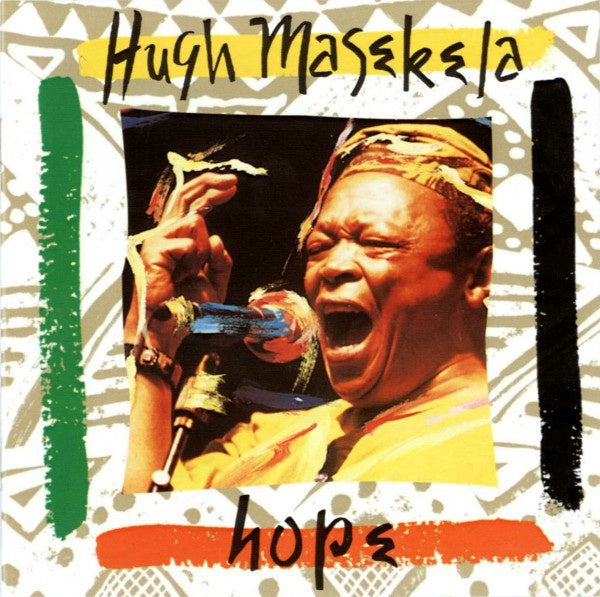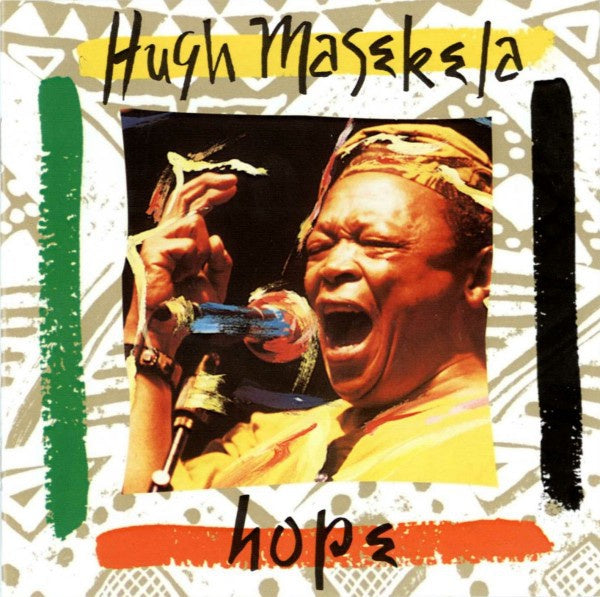Hugh Masekela Hope (Analogue Productions 33RPM Reissue)
Analogue Productions / Triloka
-
Regular price
-
$85.00 SGD
-
Regular price
-
-
Sale price
-
$85.00 SGD
- Unit price
-
per
Couldn't load pickup availability
About
— The Analog Vault // Essential Listening —
Hugh Masekela is a world-renowned South African flugelhornist, trumpeter, bandleader, composer, singer and defiant political voice. Masekela began to hone his, now signature, Afro-Jazz sound in the late 1950s during a period of intense creative collaboration, most notably performing in the 1959 musical King Kong, written by Todd Matshikiza, and, soon thereafter, as a member of the now legendary South African group, the Jazz Epistles (featuring the classic line up of Kippie Moeketsi, Abdullah Ibrahim and Jonas Gwangwa). — (via Label)
From his roots as part of the Jazz Epistles in the 1950s, to his work in the 1960s within New York’s thriving jazz scene, to his famed anti-apartheid anthems such as "Soweto Blues" and "Bring Him Back Home'' in the decades after – it is difficult to condense Masakela’s half century career as "the father of South African jazz." Thankfully, we have his 1994 live album originally released on Triloka Records to guide us through his legendary discography.
Hope is a time-travelling expedition, surveying the most iconic tunes from Masakela’s repertoire. From his chart-topping instrumental hit “Grazing in the Grass,” to an early Afro-jazz fusion highlight in "Abangoma," to a wonderful cover of Fela Kuti’s “Lady” - Hope is the ideal introduction to Masakela’s legacy as a multi-instrumentalist, singer, composer and political activist. — The Analog Vault
—
The Analogue Productions reissue of Hugh Masekela's masterpiece Hope, now available on 33 1/3 LP. Mastering from Kevin Gray at Cohearent Audio; 180-gram knock-your-socks-off silent heavyweight vinyl plated and pressed by Quality Record Pressings. Stoughton Printing tip-on old-style heavyweight gatefold jacket. The ultimate.
A longtime audiophile demonstration disc. Hope will show off your system's dynamic range as well as any record ever released. Hugh Masekela, the outstanding South African trumpeter, assembled a seven-piece group and recorded this great set live at Washington, D.C.'s Blues Alley. The songs stretch over a period of nearly five decades and serve as an informal guided tour of Masekela's life. The songs are honest and bare, and as for the sound, wow.
Unlike a prior 45 RPM version that included seven songs, this 33 1/3 reissue contains the full program as originally recorded with all 12 tracks included! Plus, as an added bonus, this version includes a special insert — featuring an exclusive interview with Grammy/Emmy Award-winning engineer David Hewitt, who recorded Hope originally.
"Hugh's record is right up near the top for a lot of reasons," Hewitt says.
Hewitt and his team were afforded the time they needed, and they pulled out all the stops to pull off what's now recognized as an all-time great recording. They used better-quality microphones, they were micing the room for ambient sound, and Masekela was performing for a sophisticated and appreciative audience.
"We used stuff from our stash of mics as opposed to what you'd find typically at a jazz club. We actually had control via the record label and producers, so we could take our time. We had the ability to mic the room for abient sound. ... you've got people that actually know and appreciate the music and respond accordingly. What you've got there is all the right stuff at the right time and the right people, and then something magical happens."
Listen to that magic unfold — put on this Analogue Productions reissue of Hope, and be transported.
"How sad, if timely: this stunning reissue of the 1994 live album arrived in the very week that trumpeter Masekela passed away. One of the most successful ambassadors ever for African music, his fusing of the continent's rhythms and instruments with contemporary jazz and rock proved irresistible. Nearly every one of you has heard him, thanks to guess spots with The Byrds and Paul Simon. His breakthough hit from 1968 — the infectious "Grazing In The Grass" — is here, along with another 11 tracks recorded at Blues Alley, the U.S. club that gave us Eva Cassidy. Notably, despite its early-1990s origins, this is all-analogue." — Sound Quality = 90% - Ken Kessler, HiFi News, May 2018
"...Hope is one of those intensely visceral, large as life, and immediately present recordings that will make pretty much any system sound at least very good, and will cause better ones to raise goose bumps." — Wayne Garcia, The Absolute Sound, August 2008
"...The high quality original mix plus Analogue Productions' superb mastering has resulted in a terrific, very transparent sonic with great impact." — John Henry, Audiophile Audition
— (via Acoustic Sounds)
↓
Label: Analogue Productions
Format: 2x Vinyl, LP, Album, Reissue
Reissued: 2018 / Original: 1994
Genre: Jazz, Folk, World
Style: African
File under: TAV Essential Listening
File under: Audiophile Jazz
⦿
Share
Analogue Productions / Triloka
- Regular price
- $85.00 SGD
- Regular price
-
- Sale price
- $85.00 SGD
- Unit price
- per
Couldn't load pickup availability
About
— The Analog Vault // Essential Listening —
Hugh Masekela is a world-renowned South African flugelhornist, trumpeter, bandleader, composer, singer and defiant political voice. Masekela began to hone his, now signature, Afro-Jazz sound in the late 1950s during a period of intense creative collaboration, most notably performing in the 1959 musical King Kong, written by Todd Matshikiza, and, soon thereafter, as a member of the now legendary South African group, the Jazz Epistles (featuring the classic line up of Kippie Moeketsi, Abdullah Ibrahim and Jonas Gwangwa). — (via Label)
From his roots as part of the Jazz Epistles in the 1950s, to his work in the 1960s within New York’s thriving jazz scene, to his famed anti-apartheid anthems such as "Soweto Blues" and "Bring Him Back Home'' in the decades after – it is difficult to condense Masakela’s half century career as "the father of South African jazz." Thankfully, we have his 1994 live album originally released on Triloka Records to guide us through his legendary discography.
Hope is a time-travelling expedition, surveying the most iconic tunes from Masakela’s repertoire. From his chart-topping instrumental hit “Grazing in the Grass,” to an early Afro-jazz fusion highlight in "Abangoma," to a wonderful cover of Fela Kuti’s “Lady” - Hope is the ideal introduction to Masakela’s legacy as a multi-instrumentalist, singer, composer and political activist. — The Analog Vault
—
The Analogue Productions reissue of Hugh Masekela's masterpiece Hope, now available on 33 1/3 LP. Mastering from Kevin Gray at Cohearent Audio; 180-gram knock-your-socks-off silent heavyweight vinyl plated and pressed by Quality Record Pressings. Stoughton Printing tip-on old-style heavyweight gatefold jacket. The ultimate.
A longtime audiophile demonstration disc. Hope will show off your system's dynamic range as well as any record ever released. Hugh Masekela, the outstanding South African trumpeter, assembled a seven-piece group and recorded this great set live at Washington, D.C.'s Blues Alley. The songs stretch over a period of nearly five decades and serve as an informal guided tour of Masekela's life. The songs are honest and bare, and as for the sound, wow.
Unlike a prior 45 RPM version that included seven songs, this 33 1/3 reissue contains the full program as originally recorded with all 12 tracks included! Plus, as an added bonus, this version includes a special insert — featuring an exclusive interview with Grammy/Emmy Award-winning engineer David Hewitt, who recorded Hope originally.
"Hugh's record is right up near the top for a lot of reasons," Hewitt says.
Hewitt and his team were afforded the time they needed, and they pulled out all the stops to pull off what's now recognized as an all-time great recording. They used better-quality microphones, they were micing the room for ambient sound, and Masekela was performing for a sophisticated and appreciative audience.
"We used stuff from our stash of mics as opposed to what you'd find typically at a jazz club. We actually had control via the record label and producers, so we could take our time. We had the ability to mic the room for abient sound. ... you've got people that actually know and appreciate the music and respond accordingly. What you've got there is all the right stuff at the right time and the right people, and then something magical happens."
Listen to that magic unfold — put on this Analogue Productions reissue of Hope, and be transported.
"How sad, if timely: this stunning reissue of the 1994 live album arrived in the very week that trumpeter Masekela passed away. One of the most successful ambassadors ever for African music, his fusing of the continent's rhythms and instruments with contemporary jazz and rock proved irresistible. Nearly every one of you has heard him, thanks to guess spots with The Byrds and Paul Simon. His breakthough hit from 1968 — the infectious "Grazing In The Grass" — is here, along with another 11 tracks recorded at Blues Alley, the U.S. club that gave us Eva Cassidy. Notably, despite its early-1990s origins, this is all-analogue." — Sound Quality = 90% - Ken Kessler, HiFi News, May 2018
"...Hope is one of those intensely visceral, large as life, and immediately present recordings that will make pretty much any system sound at least very good, and will cause better ones to raise goose bumps." — Wayne Garcia, The Absolute Sound, August 2008
"...The high quality original mix plus Analogue Productions' superb mastering has resulted in a terrific, very transparent sonic with great impact." — John Henry, Audiophile Audition
— (via Acoustic Sounds)
↓
Label: Analogue Productions
Format: 2x Vinyl, LP, Album, Reissue
Reissued: 2018 / Original: 1994
Genre: Jazz, Folk, World
Style: African
File under: TAV Essential Listening
File under: Audiophile Jazz
⦿
Share

- Choosing a selection results in a full page refresh.




